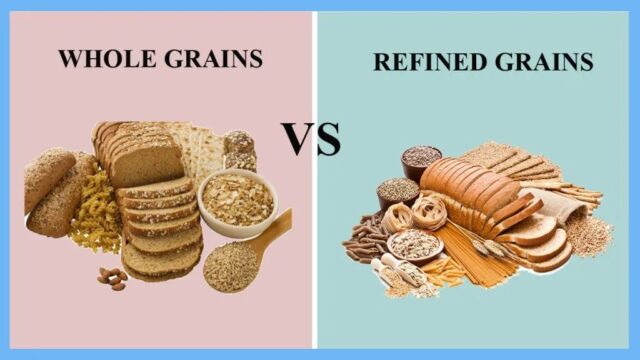Why does eating whole grains for a long time have significant benefits?
- Did Cloud Seeding Unleash a Deluge in Dubai?
- Scientists Identify Gut Bacteria and Metabolites that Lower Diabetes Risk
- OpenAI’s Model Matches Doctors in Assessing Eye Conditions
- UK: A Smoke-Free Generation by Banning Sales to Those Born After 2009
- Deadly Mutation: A New Monkeypox Variant Emerges in the DRC
- EPA Announces First-Ever Regulation for “Forever Chemicals” in Drinking Water
Why does eating whole grains for a long time have significant benefits?
Why does eating whole grains for a long time have significant benefits? What are the benefits of eating whole grains for a long time? Scientists: lose weight, lower blood pressure, lower blood sugar….
Researchers believe that whole grains help maintain waist circumference and reduce other risk factors. There may be several reasons: the dietary fiber in whole grains can produce a feeling of fullness, while magnesium, potassium and antioxidants may help lower blood pressure, especially Soluble fiber may be beneficial for reducing blood sugar spikes after meals.
As we all know, cardiovascular disease is the number one killer of human health, ranking first in the global morbidity and mortality list, killing nearly 18 million people every year. The incidence of cardiovascular disease in some countries has also been rising year after year. There are now more than 330 million patients, and 2 out of every 5 deaths are due to cardiovascular disease.
Therefore, determining evidence-based strategies to prevent cardiovascular disease is the focus of global research. Everyone knows that there are many factors that cause cardiovascular disease, and diet is an important factor. Diet is a double-edged sword. Failure is diet, and success is diet. Poor eating habits have created cardiovascular disease patients; but at the same time, it is also a modifiable factor in preventing cardiovascular disease.
It is known that eating more whole grains is good for intestinal health, and it is also associated with reducing the risk of cardiovascular disease. What impact will long-term consumption have on health?
Recently, a research team led by Tufts University and the U.S. Department of Agriculture published a research paper titled “Whole- and Refined-Grain Consumption and Longitudinal Changes in Cardiometabolic Risk Factors in the Framingham Offspring Cohort” in The Journal of Nutrition. . The study compared the long-term effects of eating whole grain foods and eating refined grain foods.

Whole grains are grains that have not been finely processed, or have retained the bran, germ, endosperm and natural nutrients of the intact grains despite the treatments such as milling, crushing, and tableting. They are commonly known as coarse grains, and therefore have a relative taste. Inferior; and refined grains with better taste usually remove the bran and germ, leaving only the endosperm part, commonly known as refined grains.



Whole grains (left), refined grains (right)
But in terms of nutrition, compared with refined grains, whole grains contain higher fiber, magnesium, vitamin E, potassium and many other phytochemical and biologically active ingredients, each of which has different benefits for cardiometabolic health. For example, soluble fiber can increase satiety and regulate the response of glucose and insulin after a meal; magnesium can increase insulin sensitivity, and polyphenols or other biologically active ingredients have been shown to change the composition of the intestinal flora.
In this study, researchers focused on how long-term consumption of whole grains and refined grains affects five key risk factors, namely waist circumference (central obesity), triglyceride and lipoprotein concentrations, blood pressure, fasting blood glucose, and high density Lipoprotein cholesterol (HDL, good cholesterol). They are clinical indicators for predicting the risk of cardiometabolic diseases, as well as risk factors or early warning signals for emerging diseases.
They analyzed data from the offspring cohort of the Framingham Heart Study, which began in the 1970s to assess long-term risk factors for cardiovascular disease. The study involved 3121 participants with an average age of 55 years. At the beginning of the study, their average body mass index (BMI) was 27.2 (overweight or obese). The average follow-up time of the study was 18 years.
To measure the participants’ daily intake of whole grains, the researchers used a dietary frequency questionnaire, which was collected every 4 years from 1991 to 2014. They used the whole grain database developed by the Harvard School of Public Health to quantify the grain content in each food and breakfast cereal, and observed the changes of 5 risk factors every 4 years, all involving 4 whole grains (types, cereals). The intake of cereals, beans and potatoes) ranges from less than half a serving per day to 3 servings or more per day.
Food survey results show that whole-grain bread and instant whole-grain cereals contribute the most to whole-grain food intake. Refined grains mainly come from pasta and white bread.
At the same time, the researchers included some potential confounding factors as covariates into the analysis, including age, gender, smoking, physical activity level, alcohol consumption, drug use, and intake of fruits, vegetables, and sugary beverages.
The results of the analysis showed that the increase in whole grain intake was related to the increase and decrease in waist size: the waist circumference of the participants with more intake increased by 1.27 cm on average; the waist circumference of the participants with the small intake increased by 2.54 cm on average, and their blood glucose levels And the average increase in systolic blood pressure is also higher. Compared with men, women are more connected.
In addition, higher intake of whole grains is also associated with increased HDL-C (good cholesterol) and decreased triglyceride concentration.
Conversely, more refined grain intake is associated with a large increase in waist circumference and a less decrease in triglyceride concentration.
Researchers believe that whole grains help maintain waist circumference and reduce other risk factors. There may be several reasons: the dietary fiber in whole grains can produce a feeling of fullness, while magnesium, potassium and antioxidants may help lower blood pressure, especially Soluble fiber may be beneficial for reducing blood sugar spikes after meals.
Nicola McKeown, the corresponding author of the study and an aging researcher at the U.S. Department of Agriculture’s Human Nutrition Research Center, said that the results of this study show that taking whole grain foods as part of a healthy diet can not only help us reduce or maintain weight as we age, but also Can bring health benefits. In fact, these data show that people who eat more whole grains are better able to maintain blood pressure and blood sugar levels. Managing these risk factors with age will help prevent cardiovascular disease.
(source:internet, reference only)
Disclaimer of medicaltrend.org
Important Note: The information provided is for informational purposes only and should not be considered as medical advice.



